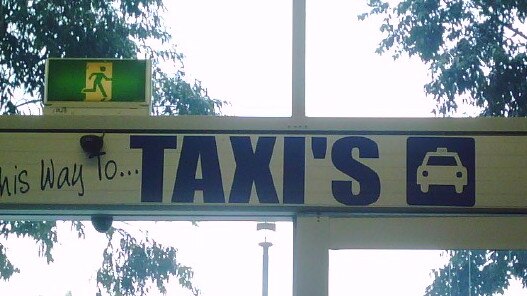Opinion: It’s the end of the English language as we know it
Between people’s inability to punctuate and text-message abbreviations, is it any wonder written English is on the way out, asks Mike Colman.
Opinion
Don't miss out on the headlines from Opinion. Followed categories will be added to My News.
I WAS very interested last week to tune in to a BBC TV panel show and catch up with the heated debate that is dividing Britain — whether or not to use the Oxford comma.
As you all know, the Oxford comma is used before the word “and” when writing a list of three or more items. Such as “apples, oranges, and pears”.
What’s not to love about the slang of today?
Mike Colman: Life of a prize-home junkie
Outrage junkies have field day over David Fifita’s Bali misadventure, writes Mike Colman
However the new commemorative Brexit 50p piece produced to mark Britain’s exit from the European Union bears the inscription, “Peace, prosperity and friendship with all nations” rather than “Peace, prosperity, and friendship…”
Needless to say, there has been a huge outcry. Academics and Oxford comma activists alike have called for the coin to be boycotted. One protester has announced she will be donating any Brexit coins that come her way to charity.
All of which got me to thinking once again about a subject that has been concerning me for several years: Why do we bother with punctuation at all? Most people don’t use it, and many of those who do aren’t really sure what to do with it.
The apostrophe has become the most misused punctuation mark since Aristophanes invented the full-stop in the 4th century BC.

There is a roadside sign not far from where I live advertising “Fresh Mango’s” and just yesterday I read an online profile of a Sydney real estate agent name Bill which boasts about “Bills’ high-profile client base”.
One only has to scroll through a blog to see how many people are wrestling over the “your or you’re” conundrum.
And don’t get me started on “there versus their”.
Actually, do get me started.
It’s no wonder that people have trouble with punctuation and spelling. The English language is nonsensical.
How can you have multiple words that sound exactly the same but are spelt (or should that be spelled?) differently and mean entirely different things?
At what point did anyone think that having whether, weather and wether in the same language was a good idea?
Which brings us to the next thing, reading. When I was at school we were taught to read by linking letter combinations to sounds.
“The letters E and R together sound ‘errr’,” Miss Cahill told us, pointing to the blackboard with the big stick that she used to hit us with if we were naughty.
Well, errr, that might be true, but how can you explain “burnt” or “earnt” or my own personal favourite, “colonel” (as opposed to “kernel”)?
Is it any wonder that the latest generation of Australians are abandoning correct spelling and punctuation usage altogether and communicating in online shorthand?
The other day I sent a text message to my 19-year-old son saying that I would pick him up at a certain time.
He texted back, “tyvm”.
I assumed he had either lost control of his fine motor skills or dropped his phone. Turned out he was saying, “Thank you very much.”
Which I shouldn’t complain about. Sometimes when he wants to acknowledge a message he just types “k”, because ”OK” would take too long.
Personally, given what I do for a living, I’m a great believer in writing and reading, and I have a healthy relationship with punctuation, even if I have been accused of going overboard on commas, and the mere sight of an exclamation mark can make me feel physically ill.
As for this Oxford comma business I must say I find it all ridiculous, pompous and trivial.
Or should that be ridiculous, pompous, and trivial.
Whatever.


